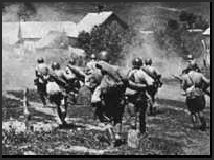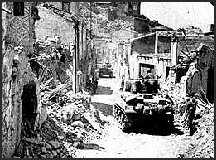 Soviet infantry on the attack. |
Project 60: A Day-by-Day Diary of WWII
Remembering the First Fight Against Fascism |
 American M-4 Sherman tank advances through a devastated Sicilian town. |
 Soviet infantry on the attack. |
Project 60: A Day-by-Day Diary of WWII
Remembering the First Fight Against Fascism |
 American M-4 Sherman tank advances through a devastated Sicilian town. |
August 3, 1943 The evacuation of Sicily by Italian
forces begins. The Soviet Voronezh and Steppe Fronts
launch a fresh set of offensives on the Belgorod-Poltava axis aimed at the
liberation of Kharkov. In heavy fighting, the Soviets break the German lines to
the west and force the 4th Panzer Army to withdraw. The Slapping Incident: While touring the front, General George Patton, commander of the US 7th Army stops in at the 15th Evacuation Hospital outside Nicosia. The facility was overrun with the newly arrived casualties from the heavy fighting by 1st Infantry Division outside Tronia. Patton, as always, was deeply moved by the sight of his men's injuries, at least until he came to Private Charles H. Huhl, L. Co., 26th Inf. Regt., 1st Infantry Division. When asked what was wrong by the General, the young man replied that "he just couldn't take it." Patton lost all control ordering him out of the tent. When the soldier didn't move, the General swore at him calling him a coward, slapped the man's face with his glove, pulled him up by the shirt collar, threw him toward the door and kicked him in the ass on his way out. August 4, 1943 Soviet forces capture Orel. Fresh
attacks are launched by the Steppe and Voronezh Fronts south of Kursk targeted
at the 4th Panzer and 8th Armies. The lines of the 52nd
Corps were broken in the initial attacks. In Sicily, British forces are fighting
in the Catania area while the Americans report heavy fighting around Tronia. In the Solomon Islands, the Americans capture Munda on New Georgia. August 5, 1943 Konev's Steppe Front captures
Belgorod and drives on toward Kharkov. In the Orel area, 2nd Panzer
Army is battered into bits in its unsuccessful bid to hold the city and its
remnants reel under the continuing advance of the Red Army. British forces captures Catania and
Paterno on Sicily. The
Swedish Government canceled its agreement with Nazi Germany which had allowed
the passage of unarmed German soldiers across Sweden between Norway and Finland.
Additionally, transport of war material was to cease August 15. Neutral Sweden
had decided to lean back toward the Allies. The US 1st Infantry Division
captures Tronia after heavy fighting. Konev's forces drive to the outskirts
of Kharkov taking Zolochev. Six American destroyers successfully
intercept 4 Japanese destroyers attempting to run troops and supplies to
Kolombangara, meeting in the Vela Gulf. Three of the Japanese destroyers were
sunk. 1500 Japanese sailors and
soldiers were killed. The new Italian government meets with
German Foreign Minister Ribbentrop and assures him that they will not be
negotiating a separate peace with the Allies. German civil defense officials order the partial evacuation of Berlin, fearing that that city would become the next Hamburg. British forces make good progress on Sicily, capturing Adrana and advancing toward Bronte. Patton launches and "end run" on Sicily landing a small amphibious force east of Sant Agata. This move surprised the Germans and they were forced to make a hasty withdrawal allowing the 7th Army forces to take Cesaro. To the east, British forces take Bronte and Acireale. In a secret negotiation between Hungry and Britain, it was agreed that RAF and American bombers flying on missions originating from Italy would not be fired on while over flying Hungry. In return, the British agreed that the Allies would not bomb Hungarian cities. After a short pause, Red Army forces continue
their drive in the Orel area, capturing Khotinets. The attacks against Kharkov
meet heavy resistance compelling Konev to divert his attacks to surround the
city. Patton launches a second amphibious "end
run", this time at Borolo. The German's were once again surprised, but
counter attacks against the beachhead caused serious losses. In the end, the
Germans were once again compelled to abandon their defenses and withdraw. Konev's forces cut the main rail line leading
into German held Kharkov. German forces begin to evacuate Sicily. The Red Army encirclement of Kharkov continues as Soviet forces take Chuguyev and drives on Plotava. The Germans are forced to pull their last major tank force (the 3rd Panzer Corps) out of the Taganrog area and move toward Plotava. American and British military leaders meet in
Quebec. This conference saw agreement on the general outline for the destruction
of the Axis. Among the topics agreed to was the cross-channel invasion of
France. D-Day was set tentatively for May 1, 1944 The US 5th Air Force, based in
Australia, hits the Balikpapan oilfields in Borneo with 380 bombers. Soviet forces tighten their grip on Kharkov, capturing Bolshaya and Danilovka. The Red Army opens a new offensive in the Smolensk area. While visiting Roosevelt in Hyde park, Churchill
and FDR agreed that British and American scientists would completely share all
efforts involved in the development of the atomic bomb. Red Army forces reach the outskirts of Kharkov. Popov's Bryansk Front captures Karachev in
heavy fighting. On Sicily, Patton attempts for a third time to
trap German forces facing him with an amphibious "end run". This time, the
Germans had already withdrawn before the sea borne force could land. Meanwhile,
British forces occupied Taormina. In one of the more embarrassing episodes in the
war, 34,436 US and Canadian troops, supported by no less than three battleships
make an amphibious landing at Kiska Island in the Aleutian Islands. The Allies
finally discover that the Japanese had abandoned the island at the end of July. The US 25th Infantry Division lands a
regiment on Vella Lavella in the Solomon Islands. Ninety-one German bombers hit Portsmouth. Italian officials meet with Allied representatives in Spain, offering to defect to the Allies as soon as the invasion of the mainland occurs. They must have forgotten their promise to Ribbentrop on the 6th. Montgomery attempts an "end run" on the east
coast of Sicily but it fails to prevent the Germans from making a successful
withdrawal. US reconnaissance forces enter Messina. Nearly 100,000 Axis troops
are successfully evacuated from the island. Popov's Bryansk Front continues to make good progress in the Smolensk area, capturing Zhidra, near Bryansk. Far to the south, the Southwest Front opens a fresh set of attacks against the Mius River line. 1941 Archive: 1942 Archive: 1943 Archive: Special Editions: Editor's Corner Archive: Hitler's Angel "The story of Prescott Bush and his association with the Nazis begins just before the end of World War I..." The Past Through Tomorrow "It is quite frightening to realize just how similar our nation's actions have been and appear to be heading when compared this way..." Afghanistan and Vietnam: When the "war against terrorism" began, many knowledgeable people warned that our operations in Afghanistan would turn into another Vietnam. Want to Win - Think Before You Lash Out - "If we are serious about taking the war to the enemy, it is time to look ..." The First Fight Against Fascism - We must remember the Spanish Civil War also. Arguing Victory - "... Each nation who fought against fascist tyranny in WWII brought with it part of whole needed to defeat that evil..." War, Glory, Honor and Remembrance - "War is a brutal and savage insult on human society..." The First
Casualty... in time of war, those in power are even more inclined to
hide the truth, since that truth is often manifest in the most gruesome and
terrible acts. Those wishing to contribute items. stories or comments should contact D.A. Friedrichs |